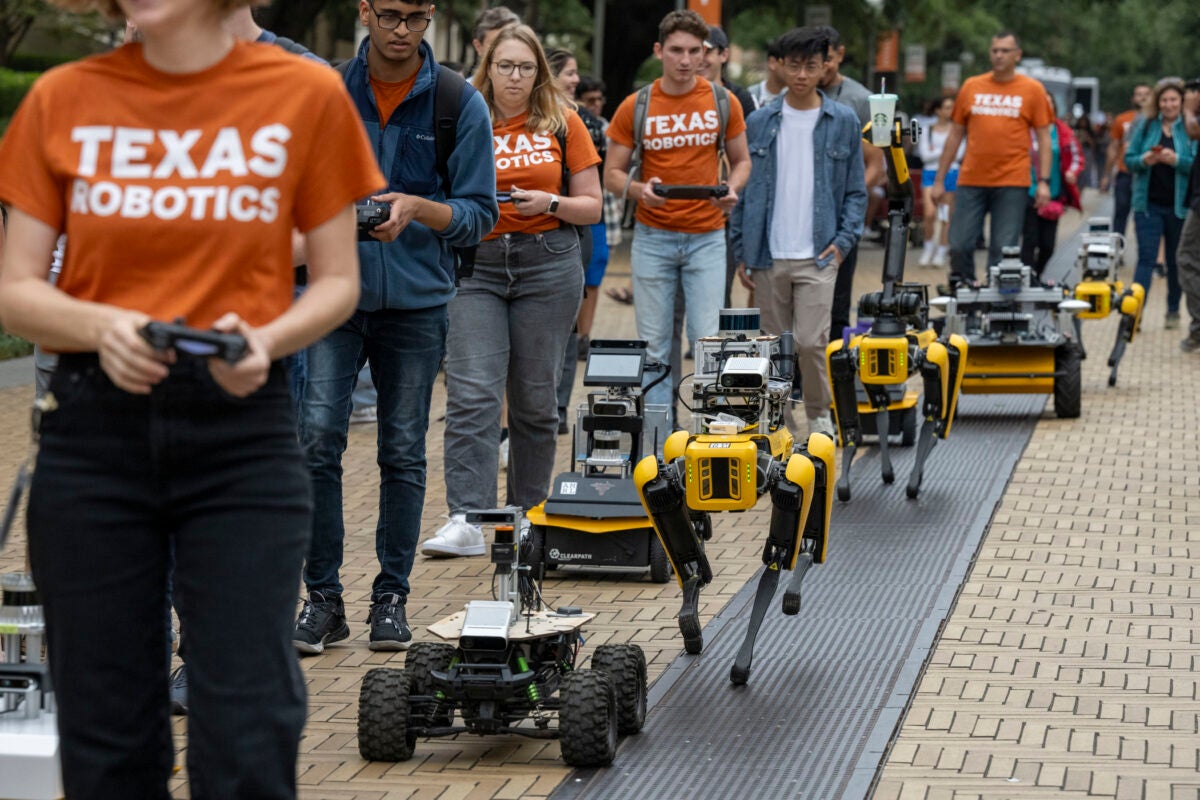UT Austin Villa Wins at 2016 World RoboCup
The RoboCup competition challenges participants to program intelligent robotic systems to operate on their own in dynamic environments.

Five of the SPL team members at the 2016 RoboCup US Open, which the team won. From left to right, they are Katie Genter, Sanmit Narvekar, Josiah Hanna, Josh Kelle and Jake Menashe.
The UT Austin Villa robot soccer team, led by University of Texas at Austin computer science professor Peter Stone, returned from the 2016 RoboCup competition in Leipzig, Germany as the world champions in the 3D Simulation league and with an impressive second-place win in the Standard Platform League (SPL).

The team worked late into the night to prepare for semi-finals.
The RoboCup competition challenges participants to program intelligent robotic systems to operate on their own in dynamic environments.
Participants in the 3D Simulation league program artificially intelligent virtual robots that compete against each other in a physically realistic simulated game of soccer.
Meanwhile, teams in the SPL league compete using identical humanoid Nao robots from Aldebaran Robotics. The challenge is to program the robots to compete as a team, without human intervention. The robots have to be able to autonomously walk, kick, navigate the soccer field and visually recognize objects and other players — all while cooperating against the opposing team.

UT Austin Villa players defend the goal from a Nao-Team HTWK player.
The UT Austin Villa’s 3D Simulation victory marks the third year in a row and fifth time in six years that the team has prevailed in this category. The second-place finish in the SPL marks the team’s best showing in that league since they won the world championship in 2012.
The SPL team started off strong this year and didn’t concede a single goal in their first five games, one of which was against the defending world champions, UNSW Australia. After another three victories, one of which was a nail-biter that ended in a sudden-death penalty-kick showdown, the team advanced to the finals.
The SPL crew’s final game was against the four-time world champion team B-Humans. UT Austin Villa successfully defeated this team in the past when they won their 2012 world champion title.

UT Austin Villa team members watch from the sidelines during a tight game with Nao-Team HTWK.
This year the two teams were well-matched with neither able to score in this final game — the first time that the B-Humans were ever held scoreless for an entire bout. The game was decided in overtime with penalty kicks and UT Austin Villa lost, claiming second place.
Videos of many of the Standard Platform games can be viewed here.
UT Austin Villa’s SPL team is made up of Stone, doctoral students Katie Genter, Jake Menashe, Josiah Hanna, Elad Liebman, Sanmit Narvekar and Ruohan Zhang, and master’s student Josh Kelle. The 3D Simulation team consists of Stone and doctoral student Patrick MacAlpine, with some help from undergraduates in a computer science course called Autonomous Multiagent Systems.



